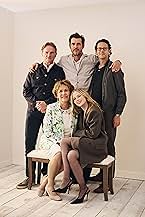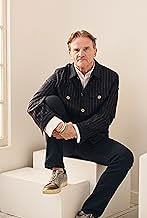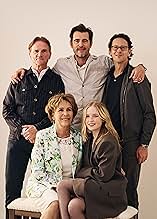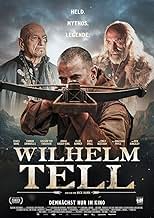A narrativa desenrola-se no século XIV, durante os dias do Sacro Império Romano, onde as nações da Europa disputam ferozmente a supremacia e os ambiciosos austríacos, desejando mais terras, ... Ler tudoA narrativa desenrola-se no século XIV, durante os dias do Sacro Império Romano, onde as nações da Europa disputam ferozmente a supremacia e os ambiciosos austríacos, desejando mais terras, invadem a Suíça, uma nação serena e pastoral.A narrativa desenrola-se no século XIV, durante os dias do Sacro Império Romano, onde as nações da Europa disputam ferozmente a supremacia e os ambiciosos austríacos, desejando mais terras, invadem a Suíça, uma nação serena e pastoral.
- Direção
- Roteiristas
- Artistas
- Prêmios
- 1 indicação no total
- Direção
- Roteiristas
- Elenco e equipe completos
- Produção, bilheteria e muito mais no IMDbPro
Resumo
Reviewers say 'William Tell' is lauded for its strong performances, stunning cinematography, and historical authenticity. The narrative of rebellion against tyranny resonates, though dialogue and pacing receive mixed feedback. Some find the script theatrical, and the middle section drags. Historical accuracy and character portrayals are debated. Despite these issues, the film's epic scope and emotional depth make it a compelling historical drama.
Avaliações em destaque
The movie is pretty poor, overall. But that's not what I'm here to flag... by far the most jarring aspect is they've lifted Al Pacino's Peach With Inches speech from Any Given Sunday, in parts practically verbatim, for Tell's rousing the troops before battle. WTF is that all about??
Not even a little bit, a nod to it, huge chunks.
"In any fight, it's the man whose willing to die..."
"You gotta look at the person sitting next to you, look in the eye and ask that person are you willing to die for me..." but delivered in the least inspiring, spine chilling way that it should make Pacino cry himself to sleep.
Not even a little bit, a nod to it, huge chunks.
"In any fight, it's the man whose willing to die..."
"You gotta look at the person sitting next to you, look in the eye and ask that person are you willing to die for me..." but delivered in the least inspiring, spine chilling way that it should make Pacino cry himself to sleep.
So... I came for arrows and rebellion.
I stayed for moody stares and dramatic cloak-swishing. And I left wondering: was this a freedom fighter or a medieval therapist with anger issues?
Claes Bang plays William Tell like he's auditioning to be the next Batman - dark, brooding, and emotionally constipated. The man shoots maybe one arrow, but delivers about 947 intense silences. Respect.
Ben Kingsley shows up and casually steals every scene with the smug energy of someone who knows this isn't going to win any awards - and doesn't care. Icon.
Highlights: Gorgeous Swiss mountains.
Enough slow-motion stares to power a shampoo commercial.
Historical drama that thinks it's Shakespeare but sometimes feels more like a LARP gone rogue.
Lowlights: Pacing so slow, I checked my pulse. Twice.
A hero with all the charisma of a wet log.
Dialogue so dramatic, it circles back to being hilarious.
Bottom line: It's not a bad movie. It's just very committed to being serious... even when it really shouldn't be. Like wearing full armor to a garden party.
Watch it with wine. Or snacks. Or while folding laundry. You won't miss much if you blink - or nap.
I stayed for moody stares and dramatic cloak-swishing. And I left wondering: was this a freedom fighter or a medieval therapist with anger issues?
Claes Bang plays William Tell like he's auditioning to be the next Batman - dark, brooding, and emotionally constipated. The man shoots maybe one arrow, but delivers about 947 intense silences. Respect.
Ben Kingsley shows up and casually steals every scene with the smug energy of someone who knows this isn't going to win any awards - and doesn't care. Icon.
Highlights: Gorgeous Swiss mountains.
Enough slow-motion stares to power a shampoo commercial.
Historical drama that thinks it's Shakespeare but sometimes feels more like a LARP gone rogue.
Lowlights: Pacing so slow, I checked my pulse. Twice.
A hero with all the charisma of a wet log.
Dialogue so dramatic, it circles back to being hilarious.
Bottom line: It's not a bad movie. It's just very committed to being serious... even when it really shouldn't be. Like wearing full armor to a garden party.
Watch it with wine. Or snacks. Or while folding laundry. You won't miss much if you blink - or nap.
William Tell is a new action adventure film directed and written by Nick Hamm, director of Driven and The Journey.
In the 14th century, the world is in a mess after the fall of the Roman Empire. Tyrannical rulers try to take as much land as possible and keep it under their control. The Austrian ruler also tries to keep Switzerland under his leadership.
The Swiss farmer William Tell (Claes Bang) helps a fleeing man from the corrupt Austrian power and thus starts a rebellious resistance against this tyranny. In the hope of getting enough support from others, they try to end this situation, in order to start a more fair rule.
Nick Hamm has experience as a director, but for this film adaptation of the Swiss legend of William Tell, he chose to write the story of the film independently for the first time. Unfortunately, he misses the mark, because he ended up with a messy film. Where he does not always seem to have been very clear about where exactly he wanted to go with the story. As a result, the story can sometimes be difficult to follow.
This is also because the film starts at a hurried pace, but then later slows down to a long-winded pace. In the smooth introduction, too many different problems and characters are introduced, most of which have their own storylines. Most of these storylines are more separate from each other and sometimes only overlap briefly, but these overlaps do not always have the same amount of use or real meaning.
You also do not get to know the many characters well enough to really care about most of them during the final battle. When people die during this battle, you do not always know exactly who has died and you also care little about most of the lost fighters.
Most of the fights are also a bit on the hurried, simple side, because William Tell quickly manages to eliminate most of his opponents. This sometimes happens with just an arrow, despite the armor that his opponents wear.
Due to the many, smooth introductions of characters, most actors do not really get a chance to make the characters their own. Some then deliver somewhat weak or exaggerated acting.
In the 14th century, the world is in a mess after the fall of the Roman Empire. Tyrannical rulers try to take as much land as possible and keep it under their control. The Austrian ruler also tries to keep Switzerland under his leadership.
The Swiss farmer William Tell (Claes Bang) helps a fleeing man from the corrupt Austrian power and thus starts a rebellious resistance against this tyranny. In the hope of getting enough support from others, they try to end this situation, in order to start a more fair rule.
Nick Hamm has experience as a director, but for this film adaptation of the Swiss legend of William Tell, he chose to write the story of the film independently for the first time. Unfortunately, he misses the mark, because he ended up with a messy film. Where he does not always seem to have been very clear about where exactly he wanted to go with the story. As a result, the story can sometimes be difficult to follow.
This is also because the film starts at a hurried pace, but then later slows down to a long-winded pace. In the smooth introduction, too many different problems and characters are introduced, most of which have their own storylines. Most of these storylines are more separate from each other and sometimes only overlap briefly, but these overlaps do not always have the same amount of use or real meaning.
You also do not get to know the many characters well enough to really care about most of them during the final battle. When people die during this battle, you do not always know exactly who has died and you also care little about most of the lost fighters.
Most of the fights are also a bit on the hurried, simple side, because William Tell quickly manages to eliminate most of his opponents. This sometimes happens with just an arrow, despite the armor that his opponents wear.
Due to the many, smooth introductions of characters, most actors do not really get a chance to make the characters their own. Some then deliver somewhat weak or exaggerated acting.
Hmmm. Never before have I heard anyone proudly declare "We are Swiss" in quite such an underwhelming manner before, and that rather sums up the lacklustre performance of Claes Bang as the title character in this verbose crossbow chronology. Traumatised by his experiences in the Crusade, he's now not a natural rebel but is instead content to live peaceably with his wife and son. When he comes to the rescue of a stranger whose wife had just been raped and murdered by the occupying troops of the King of Austria (Sir Ben Kingsley) his former valiance is rekindled and releases all manner of hell on his unprepared, unarmed and unsuspecting people. Pursued by the maniacal "Gessler" (Connor Swindell) and his blonde henchman "Stussi" (Jake Dunn), he has to rediscover his skill with the arrow, and yes - there's the legendary scene with the apple and the boy's head! There is some stunning Alpine photography mingled in with the pretty obvious CGI, and to be fair to it there are plenty of action scenes as Tell and his rapidly increasing circle of friends proves to be quite adept at reducing their foes to wriggling corpses. Sir Ben has managed to fish out his eye patch from "The Last Legion" (2007) but like Sir Jonathan Pryce, he doesn't really feature enough to make much more than a few cameo appearances to add a little bit of Thespian gravitas to this rather sterile and flat history. The characters are really lacking in charisma in this film and the long-winded dialogue and charm-free efforts from all but, perhaps, Dunn - think a weedier version of "Stamper" from "Tomorrow Never Dies" (1997) just don't really resonate much at all. There's plenty of attention to the creative detail with the costumes and castles all fitting the bill nicely but it's probably half an hour longer than it needs to be and screams sequel at us at it's all rather rushed end.
I watched the world premiere of William Tell at the Toronto International Film Festival (2024).
The presenter of the festival had said before the movie, "they don't make movies like this anymore". I assumed that was a positive thing.
Unfortunately, it really wasn't. The biggest issue of the movie was the language used.
This is a 14th-century period piece that involved the Swiss and Austrians. But for whatever reason the dialogue was written in something that sounded like a high-schooler's approximation of Victorian English.
According to the director, he wrote the dialogue to have language unique to the film. Maybe to assist in some sense of believability within this world. Instead the film was often hard to follow. Character motivations were lost in the flowery, disjointed language.
That being said - the cast did their absolute best with the film. Golshifteh Farahani, Connor Swindells, Rafe Spall, and Ellie Bamber were standouts.
Don't go to see the film for Ben Kingsley - he was barely in it and his performance felt completely phoned in.
If you're okay with 2-hours of mindlessness as you watch beautiful scenery and cool fight scenes - I think there is enough to enjoy.
The movie set up a sequel. I do hope it can be made, and some changes to how dialogue and character interactions are done will be made.
The presenter of the festival had said before the movie, "they don't make movies like this anymore". I assumed that was a positive thing.
Unfortunately, it really wasn't. The biggest issue of the movie was the language used.
This is a 14th-century period piece that involved the Swiss and Austrians. But for whatever reason the dialogue was written in something that sounded like a high-schooler's approximation of Victorian English.
According to the director, he wrote the dialogue to have language unique to the film. Maybe to assist in some sense of believability within this world. Instead the film was often hard to follow. Character motivations were lost in the flowery, disjointed language.
That being said - the cast did their absolute best with the film. Golshifteh Farahani, Connor Swindells, Rafe Spall, and Ellie Bamber were standouts.
Don't go to see the film for Ben Kingsley - he was barely in it and his performance felt completely phoned in.
If you're okay with 2-hours of mindlessness as you watch beautiful scenery and cool fight scenes - I think there is enough to enjoy.
The movie set up a sequel. I do hope it can be made, and some changes to how dialogue and character interactions are done will be made.
Você sabia?
- CuriosidadesDespite being a national hero in Switzerland, there is no concrete historical evidence that William Tell ever existed.
The earliest written account of the story appears in a 15th-century chronicle called the "White Book of Sarnen", more than a century after the events are supposed to have taken place.
Furthermore, the act of the hero shooting an apple from his son's head stems from the saga of Toko, who was a servant of the Danish King Harald Bluetooth, who died in 985. Likewise, Toko's story was written down more than two hundred years later, in the epic tale "Gesta Danorum".
Many historians view William Tell as a purely legendary figure, though his story was deeply embedded in Swiss national identity by the time of its writing.
- Erros de gravaçãoThe various castles are shown in their modern forms. Specifically, they have a large number of windows. These were all cut several centuries after the period in which the story is set, when castles were no longer required to be fortresses.
- ConexõesVersion of Guillaume Tell et le clown (1898)
Principais escolhas
Faça login para avaliar e ver a lista de recomendações personalizadas
Everything New on Hulu in August
Everything New on Hulu in August
There's a whole lot to love about Hulu's streaming offerings this month — get excited for brand-new series premieres and film favorites to watch at home.
- How long is William Tell?Fornecido pela Alexa
Detalhes
- Data de lançamento
- Países de origem
- Central de atendimento oficial
- Idioma
- Também conhecido como
- Guillermo Tell
- Locações de filme
- Empresas de produção
- Consulte mais créditos da empresa na IMDbPro
Bilheteria
- Faturamento bruto nos EUA e Canadá
- US$ 43.088
- Fim de semana de estreia nos EUA e Canadá
- US$ 26.554
- 6 de abr. de 2025
- Faturamento bruto mundial
- US$ 680.624
- Tempo de duração2 horas 14 minutos
- Cor
- Mixagem de som
- Proporção
- 2.39 : 1
Contribua para esta página
Sugerir uma alteração ou adicionar conteúdo ausente








































